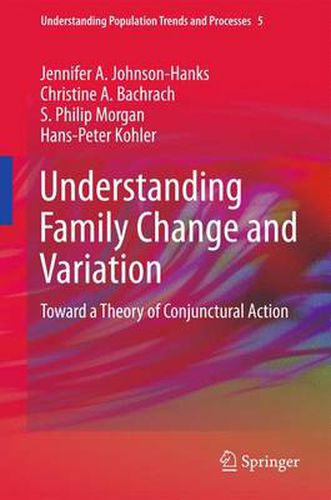Readings Newsletter
Become a Readings Member to make your shopping experience even easier.
Sign in or sign up for free!
You’re not far away from qualifying for FREE standard shipping within Australia
You’ve qualified for FREE standard shipping within Australia
The cart is loading…






This title is printed to order. This book may have been self-published. If so, we cannot guarantee the quality of the content. In the main most books will have gone through the editing process however some may not. We therefore suggest that you be aware of this before ordering this book. If in doubt check either the author or publisher’s details as we are unable to accept any returns unless they are faulty. Please contact us if you have any questions.
Fertility rates vary considerably across and within societies, and over time. Over the last three decades, social demographers have made remarkable progress in documenting these axes of variation, but theoretical models to explain family change and variation have lagged behind. At the same time, our sister disciplines-from cultural anthropology to social psychology to cognitive science and beyond-have made dramatic strides in understanding how social action works, and how bodies, brains, cultural contexts, and structural conditions are coordinated in that process. Understanding Family Change and Variation: Toward a Theory of Conjunctural Action argues that social demography must be reintegrated into the core of theory and research about the processes and mechanisms of social action, and proposes a framework through which that reintegration can occur. This framework posits that material and schematic structures profoundly shape the occurrence, frequency, and context of the vital events that constitute the object of social demography. Fertility and family behaviors are best understood as a function not just of individual traits, but of the structured contexts in which behavior occurs. This approach upends many assumptions in social demography, encouraging demographers to embrace the endogeneity of social life and to move beyond fruitless debates of structure versus culture, of agency versus structure, or of biology versus society.
$9.00 standard shipping within Australia
FREE standard shipping within Australia for orders over $100.00
Express & International shipping calculated at checkout
This title is printed to order. This book may have been self-published. If so, we cannot guarantee the quality of the content. In the main most books will have gone through the editing process however some may not. We therefore suggest that you be aware of this before ordering this book. If in doubt check either the author or publisher’s details as we are unable to accept any returns unless they are faulty. Please contact us if you have any questions.
Fertility rates vary considerably across and within societies, and over time. Over the last three decades, social demographers have made remarkable progress in documenting these axes of variation, but theoretical models to explain family change and variation have lagged behind. At the same time, our sister disciplines-from cultural anthropology to social psychology to cognitive science and beyond-have made dramatic strides in understanding how social action works, and how bodies, brains, cultural contexts, and structural conditions are coordinated in that process. Understanding Family Change and Variation: Toward a Theory of Conjunctural Action argues that social demography must be reintegrated into the core of theory and research about the processes and mechanisms of social action, and proposes a framework through which that reintegration can occur. This framework posits that material and schematic structures profoundly shape the occurrence, frequency, and context of the vital events that constitute the object of social demography. Fertility and family behaviors are best understood as a function not just of individual traits, but of the structured contexts in which behavior occurs. This approach upends many assumptions in social demography, encouraging demographers to embrace the endogeneity of social life and to move beyond fruitless debates of structure versus culture, of agency versus structure, or of biology versus society.